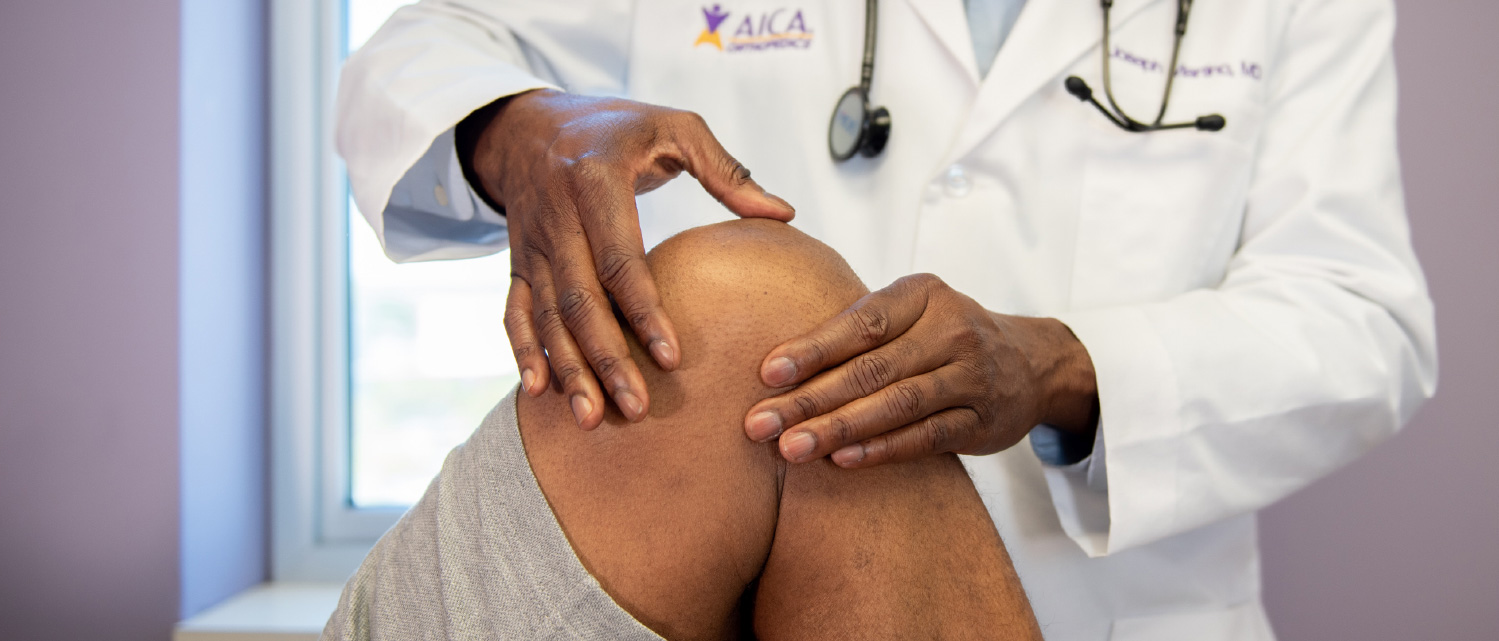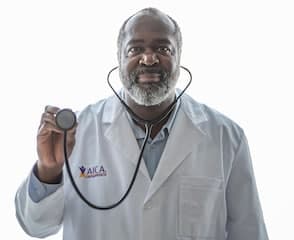
Lesiones tras un accidente de tráfico
Ortopedia AICA
Lesiones por accidente de tráfico
Por desgracia, es demasiado frecuente que una persona que ha sufrido un un accidente de tráfico sufrir una lesión. Si el impacto de una colisión ha sido lo suficientemente fuerte como para que tu vehículo haya quedado dañado, es probable que tu cuerpo también haya sufrido algún tipo de lesión por un accidente de coche. La mayoría de las personas implicadas en accidentes de coche piensan que es completamente normal sentirse mal tras un accidente. Aunque es completamente típico que un accidente de coche haga que los implicados sientan dolor por una lesión tras un accidente de coche, esto no significa que la lesión “desaparezca” por sí sola, o que el dolor vaya remitiendo con el paso de los días y las semanas. Si sospechas que te has lesionado como consecuencia de un accidente en el que has participado, es importante que busques atención médica lo antes posible para asegurarte de que tus lesiones se diagnostican y tratan adecuadamente. Para quienes se enfrentan al dolor y a los inconvenientes derivados de las lesiones por accidente de coche, puede ser muy útil conocer algunas de las lesiones automovilísticas más frecuentes y los tratamientos de las lesiones por accidente de coche.
Principales beneficios para los pacientes de lesiones personales
No hay gastos adicionales
Transporte disponible
Médicos disponibles 24/7
Todas las imágenes dentro de la clínica
Citas el mismo día
Algunos seguros son aceptados
Hablamos Español
Traumatismos craneoencefálicos/Traumatismos craneoencefálicos (TCE)
Suelen ser las lesiones más graves en accidentes de tráfico, las lesiones en la cabezay las lesiones cerebrales deben tratarse con la máxima preocupación y cuidado. Por suerte, si descubres que has sufrido una de estas lesiones más traumáticas, es muy probable que los primeros intervinientes vean pruebas de ello cuando lleguen al lugar. Si no es así, estate atento a cualquiera de los síntomas siguientes: Pérdida de claridad – problemas de memoria, dificultad para concentrarse o prestar atención, alteraciones visuales
- Dolor – dolores de cabeza, dolor en el cuello o la cabeza por una lesión por objeto contundente
- Problemas de sueño: fatiga, dificultad para conciliar el sueño o para permanecer dormido
- Cambios emocionales/de comportamiento: irritabilidad, episodios emocionales
Estas lesiones pueden llegar a ser muy graves y deben diagnosticarse y tratarse con urgencia. Un especialista en neurología será con toda probabilidad el tipo de médico al que acudirás para que te ayude a tratar tu lesión.
Lesiones cervicales o latigazo cervical
En la mayoría de las lesiones por accidente de coche latigazo cervical desempeña al menos un pequeño papel. Esto se debe a que los accidentes con lesiones casi siempre se producen como resultado de un fuerte impacto, que es una receta para que tu cuello se sacuda hacia atrás y hacia delante de una manera que producirá dolor, movilidad reducida e incluso, en casos más graves, más lesiones. Las lesiones por latigazo cervical pueden ser tratadas por médicos individuales o por una combinación de especialistas ortopédicos, quiroprácticosfisioterapeutas y, a veces, cirujanos ortopédicos. Los tratamientos pueden ser tan sencillos como medicación y fisioterapia, y tan amplios como una intervención quirúrgica en caso de desgarro o fractura.
Lesiones de médula espinal/espalda
La médula espinal y la espalda son muy susceptibles de lesionarse en un accidente de coche. Aunque las lesiones por latigazo cervical afectan sobre todo a el cuellotambién pueden tener implicaciones para la columna vertebral. Muchas personas sufren hernias y roturas discales como consecuencia de accidentes de automóvil. Las articulaciones facetarias también suelen ser víctimas de accidentes de coche que requieren fisioterapia y otros procedimientos para restaurarlas. Los accidentes de coche también pueden agravar lesiones existentes, como estenosis espinal.
Lesiones de muñeca/mano

Lesiones de rodilla
Los accidentes de tráfico afectan a las rodillas de las víctimas más comúnmente de una de estas dos formas. Las lesiones del LCP de la rodilla pueden producirse cuando las rodillas del pasajero o del conductor impactan con el salpicadero y causan lesiones en la rodilla. Este tipo de lesión se conoce coloquialmente como “rodilla del salpicadero”. A menudo provocará un desgarro o un problema de ligamentos que requerirá la atención de un traumatólogo, y posiblemente incluso un cirujano ortopédico. Del mismo modo, una lesión del ligamento lateral interno de la rodilla suele producirse cuando la rodilla golpea con fuerza otro objeto del coche. En accidentes muy graves, pueden producirse fracturas y luxaciones de rodilla, pero éstas son menos probables que las lesiones de tejidos blandos sufridas en el impacto. Sin embargo, las lesiones de tejidos blandos pueden suponer amenazas a largo plazo para los pacientes, como dolor crónico y lesiones futuras, por lo que es esencial que se atiendan de forma minuciosa y oportuna.
Lesiones de pie/tobillo
El pie tiene casi treinta huesos y es esencial para la mayoría de las tareas cotidianas. Se encarga de soportar el peso del cuerpo y la articulación del tobillo es responsable de soportar la carga de proporcionar estabilidad y flexibilidad a esta parte del cuerpo. Cuando se produce una lesión en un accidente de tráfico, el pie o tobillo es probable que deban examinarte para asegurarse de que tus lesiones no comprometen tu capacidad para desplazarte. Entre los problemas habituales a los que se enfrentan las víctimas de accidentes de coche están las lesiones compartimentales, las fracturas en los dedos de los pies o en el hueso del talón, y lo que se denominan lesiones en el mediopié. El síndrome compartimental se produce cuando se acumula una presión inmensa en una parte del cuerpo que ha sufrido un golpe devastador. Ya se trate de una lesión por aplastamiento, una fractura grave, heridas punzantes o incluso una fractura en varios sitios, puede ser susceptible de sufrir este tipo de hemorragia y acumulación de presión. Este tipo de lesión es emergente y debe tratarse rápidamente para evitar daños mayores. Las fracturas y lesiones del mediopié pueden ser de leves a graves, dependiendo sobre todo del nivel de dolor y de los cambios en la movilidad. Algunas personas acuden a urgencias por este tipo de problemas, otras buscan la ayuda de especialistas ortopédicos en los días y semanas siguientes a su accidente.
Lesiones de hombro
Lesiones de hombro de los accidentes de coche son frecuentes y suelen producirse debido a la fuerza del impacto o al instinto del cuerpo para bracear. Estas lesiones pueden incluir luxaciones, fracturas, desgarros del manguito rotador y otras lesiones de tejidos blandos. Los síntomas suelen ser dolor, hinchazón y limitación de la amplitud de movimiento en la zona del hombro. El dolor puede variar desde un dolor sordo hasta una molestia aguda y debilitante, que dificulta incluso la realización de movimientos sencillos. Puede resultar difícil levantar el brazo o realizar tareas cotidianas. Una evaluación médica rápida es esencial para evitar complicaciones y favorecer la curación. El tratamiento puede ir desde el reposo y la fisioterapia hasta la intervención quirúrgica, dependiendo de la gravedad de la lesión. Una intervención precoz ayuda a garantizar el mejor resultado y la mejor recuperación posibles.
Tratamiento de lesiones por accidente de tráfico en AICA
Ortopedia AICA ofrece un tratamiento integral de las lesiones por accidente de tráfico mediante un enfoque multidisciplinar. Nuestro equipo incluye especialistas en ortopedia, neurología, quiropráctica y fisioterapia para garantizar que cada paciente reciba un plan de tratamiento personalizado. Utilizamos herramientas de diagnóstico avanzadas para evaluar con precisión las lesiones y desarrollar estrategias de tratamiento eficaces. Desde tratamientos conservadores, como medicación y fisioterapia, hasta opciones quirúrgicas para lesiones más graves, AICA está equipada para tratar todos los aspectos de la atención a lesiones por accidente de tráfico. Nuestro objetivo es ayudar a los pacientes a controlar el dolor, restablecer la funcionalidad y reincorporarse a su vida cotidiana de la forma más rápida y segura posible.
Para obtener más información sobre cómo AICA Ortopedia puede ayudarle a recuperarse de una lesión por accidente de coche, póngase en contacto con nuestros médicos experimentados en uno de nuestros centros.









